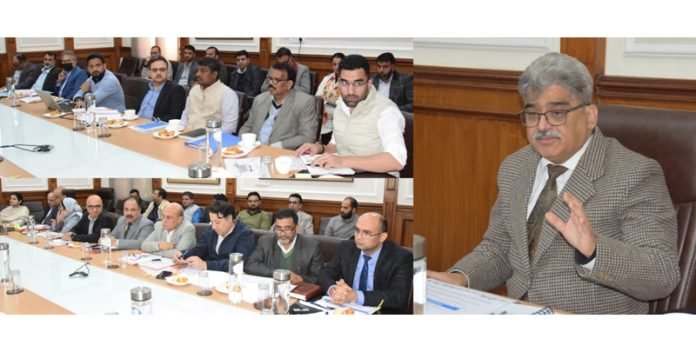In a key meeting held today, Chief Secretary Atal Dulloo conducted a thorough review of the Health & Medical Education (H&ME) Department’s initiatives to expand medical education and improve health services across Jammu and Kashmir. The meeting, attended by senior officials including the Secretary H&ME, Secretary PWD, MD NHM, Principals of Medical Colleges, and other concerned officers, focused on the steps being taken to increase MBBS, Post-Graduate (PG), and Post-Doctoral seats in medical institutions across the Union Territory (UT).
Expansion of Medical Seats and Specializations:
Dr. Dulloo began the session by addressing the Principals of Medical Colleges, seeking a detailed account of their efforts to introduce new specializations such as MD/MS, DM/MCH, and DNB in their respective institutions. The Chief Secretary emphasized the importance of expanding academic offerings to meet the growing healthcare needs in J&K.
- Addition of MBBS Seats: The Chief Secretary directed the Principals of seven new Medical Colleges to take concrete steps to add 50 more MBBS seats in addition to the existing intake capacity of 100 seats per college. He highlighted the need to optimally utilize available infrastructure and manpower to achieve this target, alongside expanding other specializations.
- Focus on Specialization Courses: Dr. Dulloo stressed the need for a well-formulated action plan to introduce specialized courses in all medical colleges and district hospitals within the next year. This would enhance the quality of medical education and cater to the increasing demand for specialized healthcare professionals.
Upgrading Healthcare Services:
In addition to educational reforms, the Chief Secretary also took stock of the ongoing efforts to upgrade healthcare services in the UT. He specifically reviewed the status of health projects across J&K, many of which are aimed at improving infrastructure and services in district hospitals.
- Tertiary Care Services: Dr. Dulloo advised the medical college principals to devise a concrete plan of action to enhance tertiary care services in the newly established medical colleges and district hospitals within the coming year. This would ensure that patients receive advanced medical care without having to travel long distances.
- Human Resource Augmentation: The Chief Secretary highlighted the critical role of adequate staffing in medical colleges and hospitals. He called for a comprehensive review of the existing human resources, particularly teaching staff, and urged the authorities to fill vacant positions, especially those of Professors. He emphasized that proper staffing is essential to improve the quality of education and healthcare services.
IT-Enabled Health Services:
As part of the efforts to modernize healthcare in J&K, the Chief Secretary also took stock of the IT-based services implemented in the UT’s hospitals. These services, aimed at digitizing healthcare delivery, include programs like Tele-ICU, e-Sanjeevani, Tele-Radiology, and e-Sahaj.
- Expansion of IT Modules: Dr. Dulloo recommended accelerating the adoption of these IT modules to create a seamless and universal health service system in J&K. He stressed the importance of integrating these services into remote districts, particularly under the Tele-ICU program, to minimize the need for patient referrals to tertiary care centers.
- Linking Far-Off Districts: To further enhance accessibility to healthcare, Dr. Dulloo suggested linking far-off districts with GMCs (Government Medical Colleges) through the Tele-ICU program. This initiative is expected to provide critical care support to patients in underserved regions and reduce the burden on medical facilities in urban areas.
Key Takeaways:
- 50 Additional MBBS Seats: New Medical Colleges urged to expand MBBS intake to enhance medical education capacity.
- Specialization Courses: Emphasis on introducing MD/MS, DM/MCH, and DNB programs to cater to specialized medical needs.
- Upgradation of Tertiary Care: Action plans to improve services at newly established medical colleges and district hospitals within the year.
- Human Resource Enhancement: Call for filling vacant teaching positions to strengthen medical education and healthcare services.
- Expansion of IT Services: Push for widespread adoption of Tele-ICU, e-Sanjeevani, and other digital tools to improve healthcare delivery and reduce referrals.

